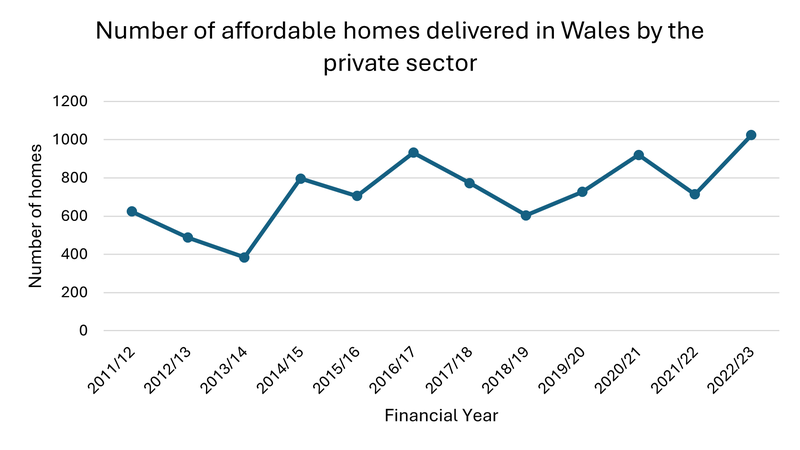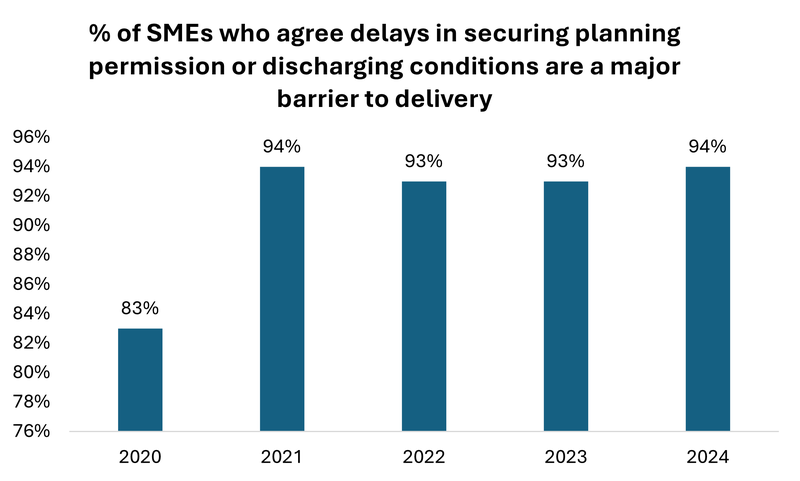The Home Builders Federation (HBF) is the representative body of the home building industry in England and Wales. Our members are responsible for providing around 80% of all new private homes built in England and Wales, and are mostly small or medium-sized enterprises.
Mon 19 May, 2025
Introduction
In this Parliamentary Newsletter from the Home Builders Federation (HBF), we update you on the ongoing and new challenges affecting the home building industry, including an overview of HBF’s latest research and campaigns.
We hope you find the information useful, but if you have any questions or would like to discuss the opportunities and challenges facing the home building industry in more detail, please contact Laurence Thompson, Policy and Campaigns Officer, at laurence.thompson@hbf.co.uk.
About HBF
Decade-low planning approvals highlight the challenge of increasing housing supply
2024 saw the fewest new homes granted planning permission for a decade, according to the latest Housing Pipeline Report from HBF, based on data from Glenigan. The figures highlight the scale of the challenge faced by the Government and industry to increase housing supply and deliver 1.5 million new homes during this Parliament.
The report shows that the number of sites granted planning permission was at a record low in 2024, with only 9,776 projects given the green light - the smallest total since HBF began reporting in 2006. To meet the Government's target of 370,000 new homes per year, planning approvals must rise by 53%.

While the Government’s swift action to address the failings in the planning system has been welcomed by the home building industry, there are several other constraints on development which must be addressed if the decline in planning permission approvals is to be reversed:
- A lack of affordable mortgage lending is suppressing demand, reducing the industry’s appetite to invest - with no government support scheme for first-time buyers for the first time in 60 years.
- Housing associations are increasingly unable to take on the Section 106 affordable housing units provided as part of every planning permission, stalling and delaying development of homes of all tenures.
- The increasing number of taxes levied on the homes being delivered is making development across swathes of the country unviable.
Lack of Government support for first-time buyers threatens house building targets and sees young people knocked off the housing ladder
New research shows that weak housing demand from prospective buyers threatens the Government’s aims to boost housebuilding and economic growth.
The Public First report supported by HBF found that the proportion of young adults that are in a financial position to buy their first home is just 10.4%, and only 350,000 households have a high enough income and savings to get onto the housing ladder. The report calls for the Government to introduce a new equity loan scheme that is part-funded by industry, available for new homes and that lowers the deposit and affordability barriers to home ownership. Introducing such a scheme would:
- Bring home ownership into the immediate reach of 490,000 more young people, widening the prospective first-time buyer market by over 80%;
- Unlock the delivery of at least 19,700 additional new homes per year, which would be 98,500 new homes over five years and an 8% increase on the Office for Budget Responsibility’s recent forecast for net supply in England, helping the Government to achieve its 1.5 million new homes target.
Another new report from HBF, Broken Ladder: Stairway to Never, also details the declining accessibility of the housing market for younger households, comparing the situation today with the experiences of previous generations that were able to benefit from government assistance onto the housing ladder.

Under Help to Buy, the most recent Government scheme to support buyers onto the housing ladder which closed in 2022, a two-income household typically needed to earn around £25,000 per person to afford a newly built home. Today, dual-income households each require incomes of over £37,000. Even accounting for salary inflation, this is a significant jump, effectively locking out a quarter of buyers who could previously have afforded to purchase.
Read the Broken Ladder: Stairway to Never report on the HBF website and the Saving the British Dream: Investing in First Time Buyers for Economic Renewal report on the Public First website.
Severe shortage of planners delaying thousands of homes
The delivery of thousands of new homes is being severely delayed as local authority planning departments struggle with severe staffing shortages, new research reveals.
The Planning on Empty report is based on a Freedom of Information (FOI) survey which received responses from 134 local authorities. The survey shows that 80% of Local Planning Authorities are operating below full capacity, with many unable to keep up with the rising demand for housing applications.
The Government has recognised the issue and has proposed recruiting 300 additional local authority planners to help address the crisis. However, this represents less than 15% of the current shortfall – with HBF’s report estimating that 2,200 planning officers needed across England and Wales to address the gap.
New environmental law increasing pressure on overstretched council planning departments
As well as causing delays in the planning process, new research from HBF reveals that the lack of capacity in local authorities is causing delays in implementing Biodiversity Net Gain (BNG) requirements.
BNG is an approach to development introduced last year, which ensures that habitats for wildlife are left in a better state at the development’s completion than before projects began. However, the FOI carried out by HBF found that councils are not equipped to process BNG applications effectively:
- Nearly 40% of local authorities lack access to in-house ecological expertise.
- A quarter of councils have seen ecologists leave their role in the past year.
- One in three councils have not expanded their ecology teams since BNG was introduced, despite the additional workload caused by BNG.
HBF is calling on the Government to put in place a strategy to address the recruitment crisis for ecologists, and for further support to help SME home builders manage the requirements of BNG.

Developer contributions intended for infrastructure upgrades sat in Local Authority bank accounts
HBF research, based on FOI responses from local authorities, reveals which councils hold disproportionately high levels of unspent developer contributions. The research shows that:
- The London Borough of Brent holds over £1,500 per household - seven times the national average.
- 4 other councils – the Royal Borough of Kensington and Chelsea as well as Wokingham, Oxfordshire and Rushcliffe councils - hold around £1,000 per household in unspent contributions.
- 45 councils hold at least twice the national average in unspent contributions on a per-household basis.
Local authorities require developers to make financial contributions to them as part of the process of granting planning permission. These developer contributions are vital in funding new infrastructure such as schools and health facilities, ensuring that communities see and feel the benefits of new development in their area. However, it is estimated that councils hold £8 billion of unspent developer contributions in total.
Local authority planning departments must be placed on a more sustainable financial footing if new infrastructure is to be delivered on time. HBF is also calling for Infrastructure Funding Statements (IFSs) published by councils to be more transparent about why funds are held unspent.
Read the unspent developer contributions research on the HBF website. For further information on the amount of developer contributions held by specific councils, contact laurence.thompson@hbf.co.uk.
HBF research shows 1,000% increase in local authority demands to ‘adopt’ new roads in 7 years
HBF research has revealed that highway bonds – the financial guarantee local councils demand of developers to ensure the road is built to agreed standards - have increased by up to 1,000% over the last seven years. Meanwhile, the time taken to approve road designs has shot up from two weeks to two years.
The report, ‘Slow Lane to Adoption,’ also outlines that there is little overarching guidance for highways authorities as to what constitutes adoptable standards, with many new roads remaining unadopted. As a result, private management companies are more frequently used, leaving residents paying additional estate management fees and service charges with no discount to council tax – therefore effectively paying double for the same service.
HBF is calling on the Government to oversee mandatory adoption to all statutory highways authorities in England and Wales under a transfer of assets, and to consider a reduction in council tax for residents of households on new estates with unadopted roads and amenities.
Parliamentary skills reception champions new entrants into the home building industry
HBF hosted a parliamentary reception on Monday 24 March to highlight the diverse range of training opportunities and entry routes available in the home building industry.
The skills showcase event, sponsored by the Chair of the Skills, Careers and Employment APPG, Lauren Edwards MP, was attended by MPs and Lords from across the political spectrum. Parliamentarians were able to meet apprentices, trainees and graduates in the industry as well as representatives from a range of developers across the country.

The skills reception coincided with the launch of new HBF research, which stressed the urgent need for the Government to work with industry to ensure it can recruit and train the people it needs to meet the Government’s housing targets.
While industry has welcomed the Government's very positive announcement of £600 million of investment to train 60,000 new construction workers, the research found that 240,000 recruits would be needed across the sector to deliver 300,000 homes a year.
HBF submits written evidence on the Planning and Infrastructure Bill
HBF has submitted written evidence on the Planning and Infrastructure Bill to the House of Commons Public Bill Committee, outlining recommendations for amendments and industry concerns.
HBF largely supports the new measures in the Bill, but is calling on Members of Parliament to ensure that the measures in the Bill do not further disadvantage SME home builders and that the legislation helps bring about a positive impact on housing supply.
HBF’s key proposals to amend the Bill include:
- Specifically referencing the introduction of a national default planning fee alongside the launch of locally set fees. This would help to prevent large variations in fees between Local Planning Authorities (LPAS), and provide more certainty for industry.
- Strengthening the obligation on the Government to monitor performance of LPAs through publication of statistics and monitoring reports.
- Ensuring that Environmental Delivery Plans are not mandatory and cover every catchment area covered by nutrient neutrality restrictions. Many home builders have invested substantially already in solutions to meet environmental obligations, and it is important that they can continue to use these solutions.
Read the full HBF Planning and Infrastructure Bill submission.
HBF calls for suspension of the planned Building Safety Levy
HBF and over 100 home builders have written to the Chancellor of the Exchequer to highlight concerns over the impact of the proposed Building Safety Levy on housing delivery and to request that the Government reassess its approach.
In the letter, HBF highlights how the new tax, expected to raise £3.4 billion and due to be introduced in 2026, is likely to severely hamper efforts to meet the Government’s target of delivering 1.5 million new homes during this Parliament, with a disproportionate and inequitable impact on SME home builders who have never built a high-rise but will be forced to pay the levy.
The letter also notes that no formal impact assessment has been conducted to estimate the levy's effect on housing supply, and that the need for the new tax has not been clearly demonstrated. It calls for a more thorough analysis before proceeding with the levy, calling for the Government to publish a robust impact assessment and consider how the tax will affect the delivery of both private and affordable homes.
Furthermore, as highlighted in the Public Accounts Committee’s recent report into the remediation of dangerous cladding, product manufacturers, some of whom were heavily criticised by the Grenfell Tower Inquiry Phase 2 report, have yet to contribute any financial support to remediation. In contrast, UK home builders have already contributed £6.4 billion towards building safety remediation efforts through a 4% precept on Corporation Tax, along with additional self-remediation commitments from over 50 builders.
Read the letter to the Chancellor of the Exchequer on the HBF website.
New build customer satisfaction climbs as 94% of buyers recommend their builder
The results from HBF’s 2025 industry Customer Satisfaction Survey (CSS) reveal that 94% of new build home buyers would recommend their builder to a friend – up 4% on last year, and marking half a decade of the industry achieving a score of 90% or above.

This continues a trend of rising scores across all question areas in recent years, reflecting the industry's positive progress. More than half of the country’s home builders are now voluntarily registered with the independent New Homes Quality Board (NHQB), which offers enhanced consumer protections and access to the independent New Homes Ombudsman Service.
The latest survey also shows that:
- 94% of respondents were satisfied with the quality of their home – up 6% from last year.
- 91% said they were satisfied with the service provided by their builder during the buying process.
HBF is calling for the Government to ensure there is a single mandatory consumer code for home builders, alongside a statutory Ombudsman scheme. These changes are vital to provide greater clarity and drive up standards further in the years ahead, as the voluntary nature of the New Homes Quality Code means there are no consistent standards for purchasers.
View the Customer Satisfaction Survey (CSS) results on the HBF website.
Record placements offered in Women into Home Building programme
In February, HBF launched the sixth cohort of its Women into Home Building programme. Delivered in partnership with 11 home builders, the programme provides training and work placements to support women into site management careers and provides valuable networking links with employers.
With women currently accounting for just 16% of the construction workforce and only 4% of site managers, the programme plays a crucial role in addressing the sector’s gender imbalance while helping to tackle the industry's ongoing skills shortage.
Neil Jefferson, Chief Executive at HBF, said:
“Building the talent pipeline and growing industry’s workforce is critical to increasing housing supply numbers at the levels required. The Women into Home Building programme helps to introduce more prospective talent to the rewarding careers available within the industry and offer valuable training to strengthen the industry's future talent pipeline.
“We are proud to collaborate with our members once again to deliver this programme at a larger scale than ever before.”
More information on the Women into Home Building programme can be found on the HBF website.